How Often Are Extinct Animals Rediscovered? A Bee and Tortoise Recently Became "Lazaraus" Species
A Fernandina Giant Tortoise and a Wallace's giant bee were recently discovered, after decades of humans thinking they were extinct.
Updated Nov. 19 2020, 9:39 p.m. ET

This week, reports broke that two animals previously believed to be extinct are, in fact, not. A Fernandina Giant Tortoise was spotted on the Galapagos island of Fernandina for the first time since 1906, and a Wallace's giant bee was observed in Indonesia for the first time since 1981, as CNN reported. With so many reports of animals joining the endangered list as of late, stories of the tortoise and bee in question may give environmentalists hope. That said, just how often are "extinct" animals rediscovered on planet earth?
First, here's a little more background on the two animals who apparently spent decades hiding out, waiting to make their triumphant return in 2019.
As The Guardian explained, Ecuador’s environment ministry confirmed that on Sunday, Feb. 17, a group of researchers on an expedition discovered a live Fernandina giant tortoise in the Galapagos. The tortoise is estimated to be more than 100 years old, and, unfortunately for her, the researchers seized her from the wild and put her into a tortoise breeding center, in hopes that they will find a male tortoise so the two can repopulate. “They will need more than one, but females may store sperm for a long time,” Stuart Pimm, a conservation ecology professor at Duke University, told The Guardian. “There may be hope.” The Fernandina Giant Tortoise discovered in 1906 was previously the only one ever observed on record, the outlet added.
Wallace's giant bee is the largest bee species on earth, typically measuring about 4 centimeters in length and 6 centimeters in wingspan, according to the BBC. Researchers found one live female Wallace's giant bee in January, 38 years after one was last spotted. The group was on a search mission for the species in the Indonesian islands the North Moluccas when they found her. As the BBC reported, the wildlife experts on the mission captured photos and videos of the bee, and temporarily captured her in a clear tube, but they did not permanently take her from the wild.
These stories sound pretty remarkable — but they are far from the first of their kind. As reported by The Conversation, more than 100 species have been rediscovered after they were thought to be extinct. In fact, these species are called Lazarus species, as a reference to the biblical story in which Jesus brings Lazarus back to life, four days after his death. A few notable Lazarus species, according to The Conversation, include: Omura's whale, the Mount Diablo Buckwheat, the Lord Howe stick insect, and the New Zealand storm petrel.
It's definitely possible that a Lazarus species could be discovered by accident — but it seems like they are mostly spotted thanks to researchers exploring lands where they think they may find the seemingly-extinct animal. However, as The Conversation suggests, working to keep endangered species alive and thriving is much more sustainable than sending researchers to find and breed the few who managed to stick around.
And according to National Geographic, the central two reasons that animals become endangered are loss of habitat and loss of genetic variation. As you can imagine, human activity such as deforestation, agriculture, pollution, and more all contribute to loss of animal habitat. So if you want to do your part in animal conservation efforts, reducing your personal environmental impact is a great place to start.